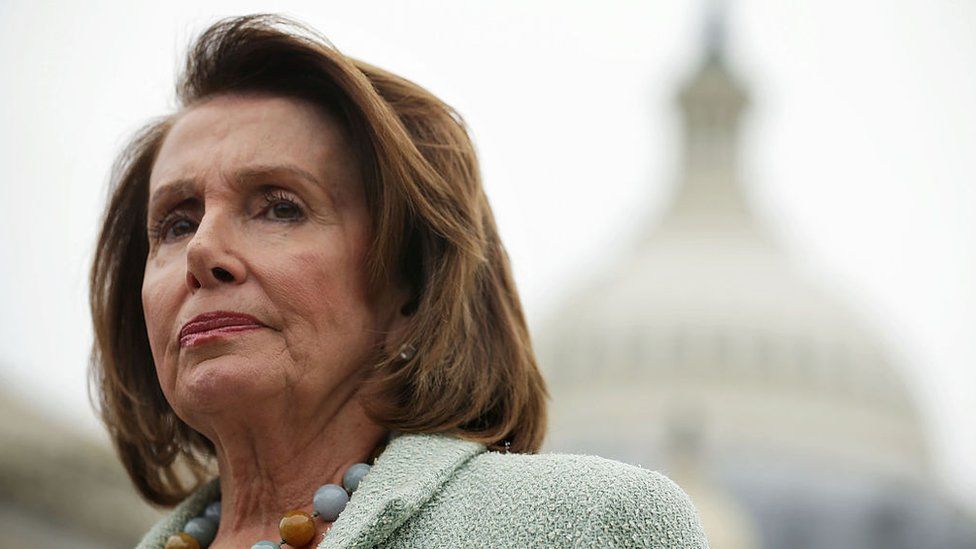ARTICLE AD BOX
By Sam Cabral
BBC News, Washington
 Image source, Getty Images
Image source, Getty Images
US House of Representatives Speaker Nancy Pelosi's rumoured plan for a trip to Taiwan has infuriated China and left the White House with a serious geopolitical headache. How big a problem is this?
On Monday, China warned of "serious consequences" if Nancy Pelosi were to proceed with a visit to Taiwan in the coming weeks.
Second in line to the presidency, Mrs Pelosi would be the highest ranking US politician to travel to the self-governing island democracy since 1997.
The potential trip has not only rankled Beijing - the Biden administration has reportedly tried to dissuade the California Democrat, 82, from going.
Last week, President Joe Biden told reporters "the military thinks it's not a good idea", but his White House has called Chinese rhetoric against any such trip "clearly unhelpful and not necessary".
The state department says Mrs Pelosi has not announced any travel and the US approach to Taiwan remains unchanged.
Why would Pelosi want to visit Taiwan?
There is strong bipartisan support for Taiwan among the American public and in the US Congress.
And over a congressional career spanning 35 years, Speaker Pelosi has been a vocal critic of China.
She has denounced its human rights record, met with pro-democracy dissidents, and also visited Tiananmen Square to commemorate victims of the 1989 massacre.
Mrs Pelosi's original plan was to visit Taiwan in April, but it was postponed after she tested positive for Covid-19.
She has declined to discuss details of the trip, but said last week that it was "important for us to show support for Taiwan".
28 years ago, we traveled to Tiananmen Square to honor the courage & sacrifice of the students, workers & ordinary citizens who stood for the dignity & human rights that all people deserve. To this day, we remain committed to sharing their story with the world. #Tiananmen30 pic.twitter.com/7UqiJVRS3t
— Nancy Pelosi (@SpeakerPelosi) June 4, 2019The BBC is not responsible for the content of external sites.View original tweet on Twitter
Why does China oppose the visit?
Beijing views Taiwan as its territory, and has repeatedly raised the spectre of annexing it by force if necessary.
Chinese officials have expressed anger over what they view as growing diplomatic engagement between Taipei and Washington. This includes a surprise visit to the island by six US lawmakers in April.
On Monday, Chinese foreign ministry spokesman Zhao Lijian warned his country would take "firm and resolute measures" if Mrs Pelosi went ahead with her visit.
"And the US will be responsible for all of the serious consequences," he said.
A spokesman of the Chinese ministry of defence seemed to suggest there could even be a military response.
"If the US side insists on going ahead, the Chinese military will never sit idle and will take strong measures to thwart any external interference and separatist attempts for 'Taiwan independence'," Colonel Tan Kefei told China Daily.
Image source, Getty Images
Image caption,Speaker Pelosi unveils a statue of the 'Tank Man' from Tiananmen Square at a rally with Chinese dissidents in 2019
US policy on Taiwan is a balancing act: it acknowledges that China considers the self-governing island to be part of "One China". But it opposes any attempts to change Taiwan's democratic status by force, and sells weapons to help Taipei defend itself.
That balance has looked more precarious with Russia's war against Ukraine: administration officials are watching for signals of what lessons Beijing might be learning, if any, that it could apply to Taiwan.
They are also anxious about increasingly aggressive Chinese statements and actions towards Taipei, including an assertion that the Taiwan Strait is not international waters.
President Biden is expected to raise both Russia and Taiwan with his Chinese counterpart Xi Jinping this week in a phone call aimed at managing the complicated relationship.
But the spectre of a visit from the Speaker of the House in this incendiary political environment threatens to raise tensions sharply.
US officials fear some sort of military response from China, although analysts doubt any imminent attempt by Beijing to annex Taiwan by force.
Citing the separation of powers, the administration has refrained from going public with its views, but some prominent Republicans have been outspoken. In an unusual twist of the partisan divide, they are backing Mrs Pelosi's trip and urging the White House to do the same.
How might the trip escalate tensions?
At its party congress later this year, the Chinese Communist Party is set to re-elect Xi Jinping to an unprecedented third term as president.
President Biden - who last spoke with President Xi in March - has said they will speak over the phone again in the next few days, on a range of topics including Taiwan and other "issues of tension".
The call comes as US officials warn of a Chinese military build-up in the Asia-Pacific region and "aggressive and irresponsible behaviour" in the South China Sea.
The threats of retaliation over Mrs Pelosi's visit have raised concerns over what China's possible response.
When then-US Health Secretary Alex Azar flew to Taiwan in 2020, Chinese air force jets crossed over the mid-line of the Taiwan Strait - the narrow waterway between the island and its giant neighbour - within range of Taipei's missiles.
Last week, the former editor of China's state-run Global Times newspaper suggested a "shocking military response" may be in store for Mrs Pelosi.
"If Pelosi visits Taiwan, [People's Liberation Army] military aircraft will accompany Pelosi's plane to enter the island, making a historic crossing of the island by military aircraft from mainland for the 1st time," Hu Xijin wrote.

 2 years ago
168
2 years ago
168








 English (US) ·
English (US) ·